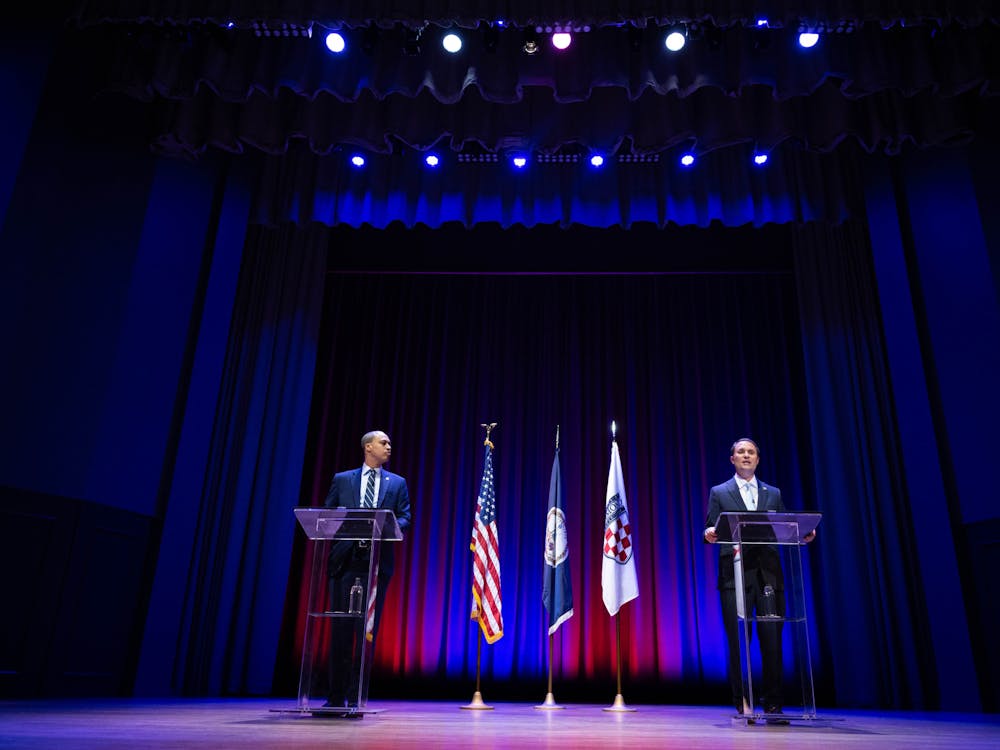Other social media platforms’ goal is to be the biggest. Snapchat's is to be the realest.
This is how Snapchat caught – and retained – young people’s attention, said Peter Hamby, head of news at Snapchat, who spoke about the intersection between news and social media at St. Christopher’s School last Thursday night.
“You’re sending an ugly selfie of yourself to your best friend, or you’re chatting with them," Hamby said. "It is, we’d like to think, an unvarnished view of yourself without the attendance to the social media need to show off to the world."
A Richmond native, Hamby has had a fruitful career covering the past three presidential elections on CNN and Snapchat, and was a fellow at the Joan Shorenstein Center on the Press, Politics and Public Policy at the John F. Kennedy School of Government at Harvard University.
The talk was part of St. Christopher's Journeys to Manhood Speaker Series. Will Bird, a St. Christopher’s alum and now a freshman at the University of Virginia, asked Hamby critical questions about social media’s influence on politics and how young people get news.
Because 70 percent of Snapchat users are under 25 years old, the platform's leaders noticed that teenagers and young adults aren’t reading the paper at breakfast or sitting down to watch the 6 o'clock news anymore. Instead, on average, users spend 30 minutes per day on social media apps such as Snapchat.
The 188 million Snapchatters are collectively creating 3 billion snaps every day -- which outnumbers the content created on the iPhone camera -- allowing Snapchat to curate stories for big news events such as the 2014 riots in Ferguson, Missouri, or natural disasters, Hamby said.
“If a plane crashed right outside right now, and there were a bunch of students here who are Snapchat users, the instinct would be to take a picture of it and give it to us," Hamby said. "So we get some incredible on-the-ground footage of everything in the world … Snapchat believes that we need to manage that and that’s why I was brought in."
Jeff E. Schapiro, a Richmond Times-Dispatch columnist, was in attendance at the event. He previously worked a beat with Hamby covering the 2008 election, Schapiro said.
“It’s a thrill because I learned, and have learned a lot, from Peter over the years," Schapiro said. "We in the press corps use social media particularly to cover politics in the large part because we’re following people’s lead."
Muhammad Coovadia, a senior at the University of Richmond and one of a few students among a crowd of parents and older members of the community, agreed with Hamby that Snapchat is different from Facebook or Instagram because it is concerned with its journalistic standards by hiring actual journalists, he said.
“As someone who watches his show [Good Luck America] every week, and have been since its beginnings, I’ve seen how you can use social media and the internet as a positive platform for putting on news shows that are different than the conventional partisanship you see on TV," Coovadia said. "I’m confident that what [Hamby's] been doing at Snapchat is the right way, or one of the right ways."
Enjoy what you're reading?
Signup for our newsletter
Nevertheless, Hamby acknowledged that social media can contribute to the loss of compromise as tribalism has infected social media, which has in turn nurtured tribalism, he said.
“Twitter is not the place for nuance or reason,” Hamby said.
As an example, he explained that Sen. Ted Cruz recently went to an Italian restaurant with his wife and protesters barged in to chase him out. Hamby tweeted about how disturbed he felt that politicians can’t even eat in peace anymore, and he was attacked by Twitter users who said, “'You’re out of touch, and you’re a rich guy, and you’re an elite,'” Hamby said.
“The incentive structure of social media fuels this, gerrymandering fuels this, cable news fuels this, and I’m worried that there’s not really a way to go back," Hamby said. "And that’s something that’s not optimistic at all, but it’s hard to imagine how social media gets better. I don’t have a road map for that."
However troubled he might be by the state of news in the hands of social media, when asked about where social media is headed in the next 10 years, Hamby said he was hopeful for the future.
“What I’m hopeful for -- and this is the same reason why I’m getting back into vinyl, the same reason I like reading books and not e-books -- is that with this digital overload all the time, there’s gonna be some kind of cultural yearning for, 'Can someone make sense of this?'" Hamby said. "And I think that’s why long-form journalism does so well because people like to step back and drink in a subject a little more deeply. And I hope culturally we’ll get there."
Contact news writer Nancy Lam at nancy.lam@richmond.edu.
Support independent student media
You can make a tax-deductible donation by clicking the button below, which takes you to our secure PayPal account. The page is set up to receive contributions in whatever amount you designate. We look forward to using the money we raise to further our mission of providing honest and accurate information to students, faculty, staff, alumni and others in the general public.
Donate Now



